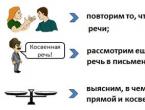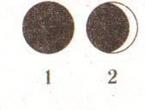Olympiads in history, social studies, law and economics. The municipal stage of the All-Russian Olympiad for schoolchildren is rightfully. Municipal stage of the All-Russian Olympiad for schoolchildren in economics
The working concept of giftedness. Epiphany D.B., Babaeva Yu.D. et al. (.pdf) (download)
Guidelines for conducting the school and municipal stage of the All-Russian Olympiad for students in history in the 2014/2015 academic year. (.pdf) (download)
Guidelines for conducting the school and municipal stages of the All-Russian Olympiad for students in social studies in the 2014/2015 academic year. (.pdf) download
Guidelines for conducting the school and municipal stages of the All-Russian Olympiad for schoolchildren by law in the 2014/2015 academic year. (.pdf) download
Guidelines for conducting the school and municipal stages of the All-Russian Olympiad for students in economics in the 2014/2015 academic year. (.pdf) download
Archive of olympiads on the history of Russia
School stage of the All-Russian Olympiad for students in history
School stage 2013-2014, questions + criteria, (5-11 grades) (.doc) 8.32 Mb download
Municipal stage of the All-Russian Olympiad for students in history
Municipal stage 2013-2014, questions + criteria, (7, 8, 9, 10, 11 cells.) (.Doc) 6,22 Mb download
Municipal stage 2012-2013, questions + criteria, (7, 8, 9, 10, 11 cells) (.doc) 5.81 Mb download
Municipal stage 2011-2012, questions + criteria, (7, 8, 9, 10, 11 cells) (.doc, .pdf) 16.7 Mb download
Municipal stage 2010-2011, questions + criteria, (9, 10, 11 cl.). (.doc, .pdf) 6.81 Mb download
Municipal stage 2009-2010, questions, (9, 10, 11 cl.). (.doc) 2.38 Mb download
Regional stage of the All-Russian Olympiad for students in history
The regional stage of 2013-2014, questions + criteria, (9, 10, 11 classes). (.doc) 8.2 Mb download
The regional stage of 2012-2013, questions + criteria, (9, 10, 11 classes). (.pdf) 2.16 Mb download
The regional stage of 2011-2012, questions + criteria, (9, 10, 11 classes). (.pdf) 2.06 Mb download
The regional stage of 2010-2011, questions + criteria, (9, 10, 11 classes). (.doc) 1.6 Mb download
The regional stage of 2009-2010, questions + criteria, (9, 10, 11 classes). (.doc) 4.51 Mb download
The final stage of the All-Russian Olympiad for students in history
All-Russian stage of 2013-2014, questions + criteria, (9, 10, 11 classes). (.pdf) 2.93 Mb download
All-Russian stage of 2012-2013, questions + criteria, (9, 10, 11 classes). (.pdf) 2.49 Mb download
All-Russian stage of 2011-2012, questions + criteria, (9, 10, 11 classes). (.pdf) 2.69 Mb download
All-Russian stage of 2010-2011, questions + criteria, (9, 10, 11 classes). (.doc) 6.92 Mb download
All-Russian stage of 2009-2010, questions + criteria, (9, 10, 11 classes). (.pdf) 7.27 Mb download
Archive of Social Science Olympiads
School stage of the All-Russian Olympiad for schoolchildren in social studies
School stage 2013-2014, questions + criteria, (6-11 cells) (.doc) 844 Kb download
Municipal stage of the All-Russian Olympiad for school students in social studies
Municipal stage 2013-2014, questions and criteria, (7, 8, 9, 10, 11 classes). (.doc) 4.9 Mb download
Municipal stage 2012-2013, questions and criteria, (7, 8, 9, 10, 11 classes). (.doc) 83 Kb download
Municipal stage 2011-2012, questions and criteria, (8, 9, 10, 11 classes). (.doc) 48 Kb download download
Municipal stage of the All-Russian Olympiad for schoolchildren in economics
Municipal stage 2013-2014, questions and criteria, (7, 8, 9, 10, 11 classes). (.doc) 184 Kb download
The regional stage of the All-Russian Olympiad for students in economics
The regional stage of 2013-2014, questions and criteria, (9, 10, 11 classes). (.doc) 412 Kb download
Archive of Laws
The school stage of the All-Russian Olympiad for schoolchildren by law
School stage 2013-2014, questions + criteria, (9-11 cells) (.doc) 78 Kb download
The municipal stage of the All-Russian Olympiad for schoolchildren by law
Municipal stage 2013-2014, questions and criteria, (8, 9, 10, 11 classes). (.doc) 280 Kb download
The regional stage of the All-Russian Olympiad for schoolchildren by law
The regional stage of 2013-2014, questions and criteria, (9, 10, 11 classes). (.doc) 273 Kb
7th grade.
Exercise 1. Choose 1 correct answer in each task (2 points for each correct answer, maximum score - 8).
Answers:
Task 3.
What unites the concepts, events, names that form each of the presented series? Give a short answer (2 points for each task, the maximum score is 6):
Answers:
3.1. The invasion of Russia Batu (Mongols, Mongol-Tatars)
3.2. Organs of central authority (central administration) under Ivan III.
3.3. Participants in the feudal war (the last princely strife) of the second quarter of the XV century.
Task 4.
Restore the chronological sequence of events (2 points for each correctly indicated digit, the maximum score is 12):
Answer:2, 1, 4, 5, 6, 3
Task 5.
Set the match. Write down the selected numbers in the table under the corresponding letters. (1 point for each correctly indicated digit, the maximum score is 15):
Answers:
| № | A | B | IN | G | D |
| 5.1. | 5 | 3 | 4 | 1 | 2 |
| 5.2. | 3 | 6 | 1 | 2 | 4 |
| 5.3. | 2 | 4 | 6 | 1 | 3 |
Task 6.
Read the excerpt from the document and answer the questions. (1 point for each correctly filled pass, the maximum score is 8).
Answers:
6.1. Judicial Code of Ivan III (1 point)
6.2. 1497 g. (1 point)
6.3. The lord (landowner) (1 point ). The elderly (1 point ).
6.4. Tsarist Judicial (Ivan IV the Terrible) (1 point ) 1550 g. (1 point )
6.5.
The formation of serfdom (1 point
).
Cathedral Code 1649 g . (1 point
)
Task 7 (*task with a regional component
) The maximum score is 8. For each correct answer, 2 points.
Answers:
7.1. dalmatovo city.
7.2. icon of the Assumption of the Mother of God.
7.3. shadrinsk.
7.4.
Nikolai Alexandrovich Yushkov.
Task 8.
Carefully review the map and complete the tasks. (2 points for each correct answer, the maximum score is 18).
Answers:
| Name of the trade route |
|
| Way from the Varangians to the Greeks |
|
| Seas |
|
| I | Varyazhskoe |
| II | Russian (or Pontic, Pontus) |
| Cities |
|
| 1 | Chersonese (Korsun) |
| 2 | Kiev |
| 3 | Chernihiv |
| 4 | Smolensk |
| 5 | Pskov |
| 6 | Velikiy Novgorod |
Task 9.
The student prepared illustrative material for the presentation on the topic: "Moscow architecture of the XV-XVI centuries." But the teacher found among the illustrations presented architectural monuments that cannot be attributed to this period. Help the student correct the mistakes. Select the correct illustrations and write down the numbers of the necessary monuments (The maximum score is 10, 2 points for each correct answer).
Answer : 3, 4, 7, 8, 9
The maximum number of points is 91.
MAIN DEPARTMENT OF EDUCATION OF THE KURGAN REGION
MUNICIPAL STAGE OF THE ALL-RUSSIAN OLYMPIAD
SCHOOLCHILDREN HISTORY 2013-2014 ACADEMIC YEAR
8TH GRADE
Exercise 1.
Select 1 correct answer in each task and enter the selected answers in the table (2 points for each correct answer, the maximum score is 8):
Answers:
Task 3.
By what historical criterion are the rows formed (2 points for each row, maximum 6 points).
Answers:
3.1. The name of government posts that appeared under Peter I
3.2. Cities founded under Boris Godunov
3.3.
Money Names
Task 4.
Match the elements of the right and left columns of the table. In the list on the right there is an extra characteristic (3 points for each match, the maximum score is 12).
Answers:
| 1 | 2 | 3 | 4 |
| G | D | A | B |
Task 5.
Define the chronological order of events. Enter the letter designations of the events in chronological order in the table below (1 point for each correct answer, the maximum score is 18).
Answers:
| № | 1 | 2 | 3 | 4 | 5 | 6 |
| 5.1. | g | d | a | b | in | e |
| 5.2. | b | g | e | in | a | d |
| 5.3. | g | d | b | e | a | in |
Task 6. Fill in the numbered gaps in the text. Insert the inserted concepts (names, dates, terms) under the corresponding serial numbers in the table (1 point for each correct answer, the maximum score is 18).
Answers:
| № | insert | № | insert |
| 1 | a business | 10 | Minich |
| 2 | Cathedral Code | 11 | Catherine the Great II |
| 3 | Preobrazhensky | 12 | The senate |
| 4 | Secret Office | 13 | Mirovich |
| 5 | tsarevich Alexey | 14 | Shlisselburg |
| 6 | Peter-Pavel's Fortress | 15 | Tarakanova |
| 7 | Supreme Privy Council | 16 | Radishchev |
| 8 | Anna Ivanovna | 17 | Novikov |
| 9 | A.P. Volyn | 18 | Alexander I |
Task 7.
Explain the origin of the following concepts (names) (1 point for each answer, the maximum score is 6):
Answers:
7.1. Nikon Chronicle - (by the name of the owner of the annals - Patriarch Nikon)
7.2. Makaryevskaya fair - (by the name of the Makaryevsky monastery)
7.3. Yam-Zapolsky world - (by the name of the settlement where the contract was concluded)
7.4. Diaghilev seasons - (by the name of Diaghilev, a theatrical figure, the organizer of these seasons)
7.5.Lensky execution - (by the name of the Lena River, on which this event occurred)
7.6.
Five year - (by the number of years for which the development of the national economy was planned in the USSR)
Task 8.
Read the historical source and complete the assignments. (4 points for each answer, the maximum score is 12).
Answers:
8.1. 1774 g. (1773-1775; 70s of the 18th century; second half of the 18th century).
It is an event in the period peasant war under the direction of Emelyana Pugachevaduring which there was a siege of the fortress of Orenburg. The Empress thanks the defenders of the fortress.
8.2. From the point of view of the authorities, the rebels are violators of the law. They violated the "oath", that is, the law and the primordial custom to obey the nobles and royal power, became "thieves", that is, robbers, because plundered landowner estates, killed nobles, etc.
8.3.
Catherine the Great, first of all, refers to noblesbecause it was this estate that became the social pillar of the tsarist government, the empress pursued a policy in the interests of the nobility, including because she herself ascended the throne with the support of this estate. The empress also refers to city \u200b\u200bdwellers: merchants and philistines.
Task 9.
Student prepared illustrative material for presentation.
1) 1812, 1914 - 1918, 1941 - 1945.
2) A.N. Seslavin, G.M. Kurin, E.V. Chetvertakov.
3) The abolition of labor service, the transition from in-kind wages to cash, refusal of surplus appraisal.
4) Ensign, warrant officer, cornet, cornet.
Fill in the pass in the transfers:
1) 1st Belorussian Front, G.K. Zhukov; 2nd Belorussian Front, [...]; 3rd Belorussian Front, A.M. Vasilevsky.
2) The capture of Kazan, St. Basil's Cathedral; World War 1812, Cathedral of Christ the Savior in Moscow; [...], Monument to the heroes of Pleven in Moscow.
Arrange in chronological order:
A. Rise of the Decembrists.
B. Publication of the book "Journey from St. Petersburg to Moscow."
B. Foundation of the Northern Union of Russian Workers.
G. The Union of Liberation.
D. Foundation of the Emancipation of Labor group.
E. The assassination of Alexander II by the Volunteers.
Appeal to the literature.The hero of the novel “Dead Souls” by N.V. Gogol Chichikov bought the dead serfs from the landowners in order to get a loan on their bail. Was such a situation possible in reality and, if so, why?
Insert the missing letters and briefly define the meaning of the words:
1) K ... l ... bottom ... ia.
2) Ku ... ks ... ame ... a.
3) M ... r ... an ... ilism.
4) ... built in ... n ... tech.
5) M ... m ... r ...
Distribute the following provisions into three groups, depending on which parties they belong to, and write the answer numbers in the table.
1. The party’s birth date is the publication of the draft party program in the Slovo newspaper dated November 9, 1905.
2. After the First Russian party leadership emigrated from Russia.
3. The central newspaper was the Voice of Moscow newspaper.
4. The ideal of their political regime was a socialist republic.
5. When the First World War began, the party leadership took an anti-patriotic position.
6. Being essentially a peasant party, they advocated the distribution of land between peasants in a leveling-labor form.
7. In achieving their political goals, they did not shun illegal methods (individual terror, organization of uprisings, expropriation).
8. The party came to power.
9. In the elections to the Third State Duma, they received the largest number of seats, and the party leader became chairman of the Duma.
10. During the First World War, the party gradually ceased to exist.
The text below contains underlined and numbered provisions. Put “yes” (if this is a valid statement) or “no” (if it is a mistake) next to the corresponding number and correct those statements that you consider to be erroneous.
Exactly 110 years ago, in 1796, Empress Catherine II died. Sophia Augusta Frederic of Anhalt-Zerbtska adopted the name "Catherine" upon accession to the throne (1) in 1763 (2). She learned to speak Russian perfectly (3), and Russia fell in love and faithfully served its interests. She convened in 1769 (4) Stated Commission managed to adopt a new Code of laws of the Russian Empire (5), and the empress herself was destined to go down in the history of Russia as ruler, prohibiting the use of the word "slave" in appeals to her subjects " (6).




